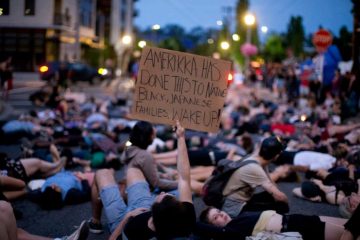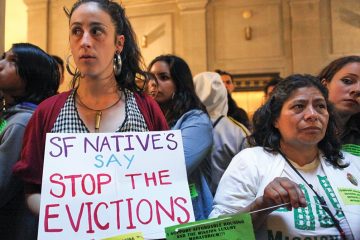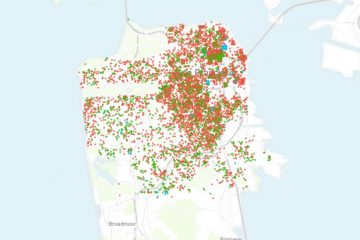The New SF Owner Move In Laws Might Keep You in Your Home

San Franciscans fighting against evictions, including Owner Move In Evictions (image from the SF Examiner)
Ask a Tenant Attorney is your chance to learn how to survive as a tenant in San Francisco. Each month Tenant’s Rights Attorney Daniel Wayne addresses a different issue for residential tenants. For more information about Daniel and his firm, check out his website at www.wayne-law.com. Have a suggestion for a landlord-tenant topic you want Daniel to address in the column? Send an email to alex@brokeassstuart.com and we will pass it along!
In San Francisco tenants covered by the Rent Ordinance can only be evicted if a landlord has one of sixteen “just causes” for eviction. These include “fault” evictions such as failing to pay rent, and “no fault” evictions where a tenant has done nothing wrong. Owner Move In Evictions, along with Ellis evictions are one of the most common types of “no fault” evictions used by landlords.
The idea behind owner move in evictions (“OMIs”) is to allow an owner a way to move into their own property. On its face it seems reasonable enough. You own a place you want to be able to move in if you need/want to. However, for years landlords have abused this right. It is often used as a threat in buyout negotiations. In other situations landlords will evict tenants for an OMI and then never move in, and instead re-rent the unit for market rent.
Because this law has been abused the Board of Supervisors finally decided to do something about it and, last year passed new laws to make it more difficult for landlords to abuse the laws, and to up the consequences of doing so.
What’s New
In August 2017 the San Francisco Rent Ordinance was amended to further restrict the laws regulating a landlord’s right to owner move-in evictions. Some of these changes came into effect in August 2017, while others did not take effect until January 2018. Below is a brief rundown of the changes you need to know about.
1. You Have More Time to Sue Your Landlord for a Bogus OMI
Until the law was updated, tenants who were evicted pursuant to an owner move in eviction had just one year to bring a lawsuit against a landlord that failed to actually move in. Now tenants have FIVE years to bring a lawsuit. This reduces the amount of pressure on tenants to keep a close watch on their former homes and take immediate action. It also lessens the chance that sneaky landlords can get off scot-free on a technicality. It also, hopefully will discourage landlords from filing owner move in notices and then never moving in.
2. Your Landlord Can’t Jack Up the rent on a new Tenant for Five Years
In San Francisco rent gets re-set when all tenants move out and a new tenancy begins. In the past a landlord could use an OMI to boot a tenant and then charge a new tenant market rent (after living in the apartment themselves for three years). Now, a landlord essentially has to live in the apartment five years before they can charge market rate. If the landlord moves out after three years they can re-rent it but ONLY at the rent the last tenant was paying. This is designed to discourage landlords from using an owner move-in eviction as a pretext to evict a tenant in order to charge higher rent to a subsequent occupant.
3. Your Landlord Has to Check in With the Rent Board . . . A Lot
Under the former rules your landlord had to serve you with an owner move in eviction notice and provide the Rent Board with a copy and then they could call it a day. Now, landlords have an obligation to keep the Rent Board in the loop for five years after filing an eviction notice for an owner move in. Landlords have to let the Rent Board know where they are living every 90 days after the date of service of an OMI notice until they move in, and then file an update once a year for five years after recovering possession. In other words if your landlord wants to lie about living in your old apartment they really have to double down on their lie.
4. Non profits Now Can Sue Shady Landlords
Another feature of the new law is that it gives non profit housing organizations standing to sue landlords who violate owner move in laws. Before, only tenants could sue a landlord for failing to abide by the law. This change gives bad acting landlords another reason to behave and ups the ante that they may face consequences if they fail to do so.
5. If Your Landlord Doesn’t Stick Around for Five Years You Can Move Back in … At Your Old Rent
By law if a landlord does an owner move in eviction they only have to live there (as their primary residence) for three years. In the past your landlord could move out after three years and rent the place out to a new tenant at market rate. Now, owners have an obligation to offer you the option to move back in at your old rent if they don’t stay for five years.
Even with these changes it is worth keeping an eye out on your old home if you were evicted for an owner move in eviction. If your landlord did not move in or fails to stay the full amount of time required by the law you may have grounds for a lawsuit that could lead to substantial financial damages. For the full text of the changes check out the SF Rent Board: https://sfrb.org/sites/default/files/OMI%20Amendments%208.27.17.pdf
Note that the opinions expressed in this and Daniel’s other articles are those of the author and do not constitute legal advice. The information provided is general in nature. For more information or to see if these opinions apply to your situation seek the advice of a tenant attorney for any specific problem or issue. You understand that no attorney-client relationship will exist with Daniel Wayne or the Law Offices of Daniel W. Wayne, PC unless they have agreed to represent you. You should not respond to this site with any information that you believe is confidential.









